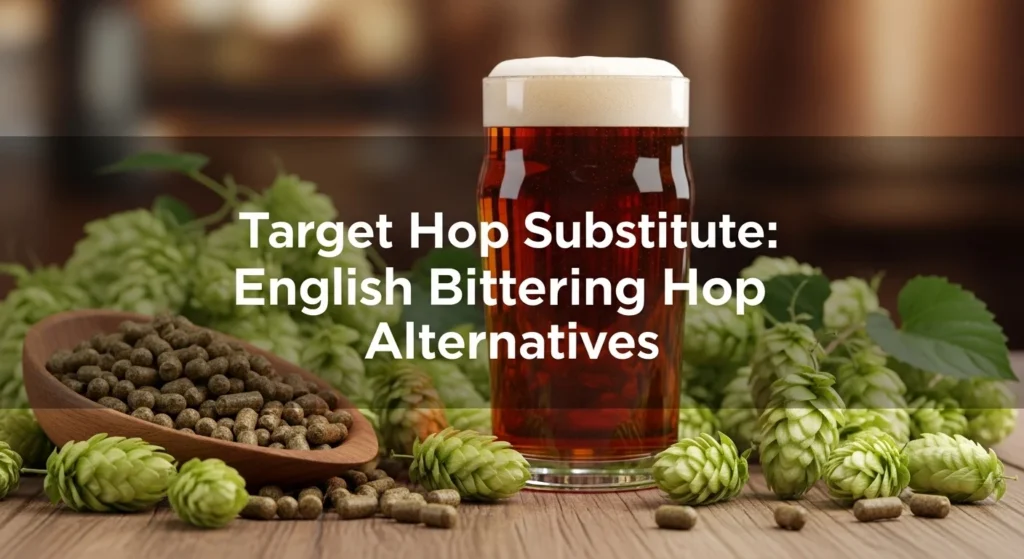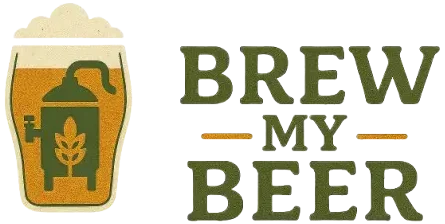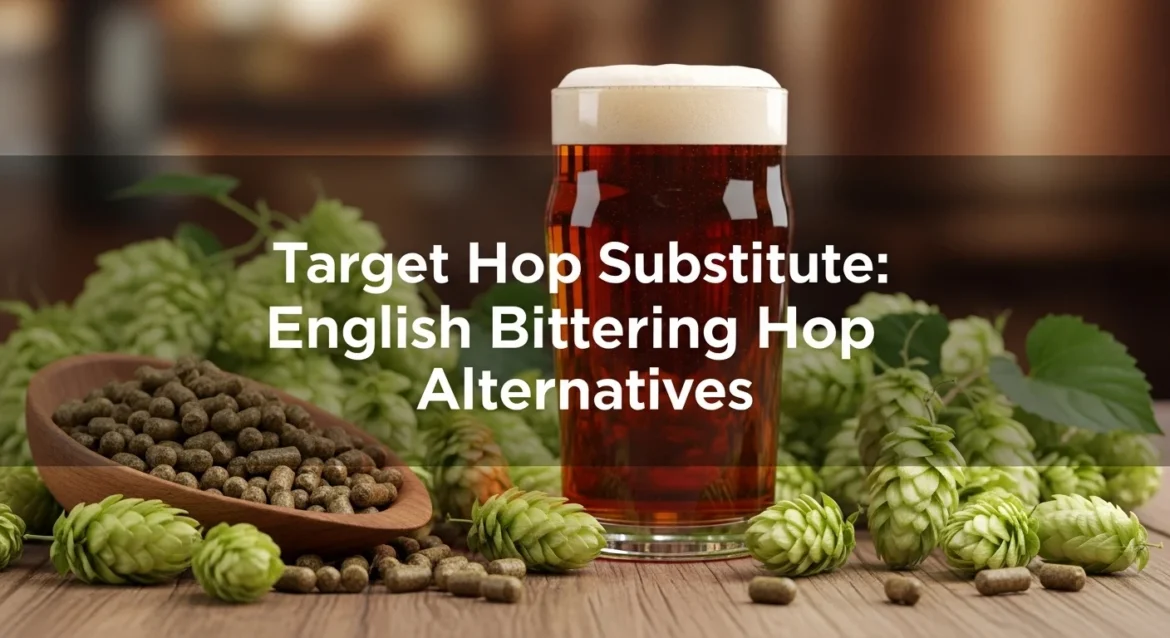Find the best Target hop substitutes with English bittering character. Discover traditional and American alternatives for authentic English ales and bitters.

Planning that robust English bitter with Target hops only to discover they’re sold out at your supplier? I’ve experienced that exact frustration more times than I care to count in my brewing career. This powerful English bittering hop has become increasingly popular for craft beer brewing thanks to its high alpha acids and distinctive sage-herbal character, creating demand that occasionally exceeds availability at local suppliers. The good news? Several English and American-grown hop varieties can replicate those distinctive earthy, herbal, and spicy notes that make Target essential for bold British styles.
Finding the right Target hop substitute requires understanding what makes this hop special beyond just high alpha acids. It’s about capturing that distinctive combination of earthy sage, herbal complexity, and spicy English character with high bittering efficiency that defined modern English brewing. After brewing with Target and testing various alternatives over the past decade, I’ve identified which substitutes actually deliver on their English bittering promises and which fall disappointingly short when robust British character matters.
This guide explores proven alternatives that maintain your beer’s intended flavor profile while respecting brewing traditions. Whether you’re brewing an English bitter, ESB, or robust porter, you’ll find practical solutions that work.
Understanding Target’s Bittering Power
Target emerged in 1972 from Wye College breeding as cross of Northdown with Eastwell Golding. This dual-purpose hop delivers earthy, herbal, sage, spicy, and English characteristics with high alpha acids of 9-12.5%. What distinguishes Target from other English hops is its remarkably high alpha acid content combined with distinctive sage-herbal character that creates efficient bittering with authentic English terroir impossible to replicate with American varieties.
The hop’s development represented English brewing’s response to demand for high-alpha domestic hops that could compete with American and German bittering varieties while maintaining English character. Target’s high alpha acids create efficient bittering while its distinctive sage-herbal aromatics provide genuine English complexity when used in late additions.
When I first brewed with Target in a traditional English bitter eight years ago, the powerful bittering combined with sage-herbal backing created exactly the robust British character I sought. That bold, authentic efficiency is Target’s magic – powerful enough for modern hopping rates yet English enough to honor brewing heritage.
Top Target Hop Substitute Options
Challenger: Classic English Alternative
Challenger stands as the most logical Target substitute for brewers seeking English character with moderate alpha acids. This traditional English variety delivers earthy, spicy, floral, cedar, and English characteristics with moderate alpha acids of 6.5-8.5% that require quantity adjustments.
Released from Wye College breeding in 1972 (same year as Target), Challenger shares similar English breeding heritage. The hop’s emphasis on earthy-spicy character approximates Target’s English nature while offering lower alpha acids and more pronounced cedar-floral complexity.
I’ve successfully substituted Challenger for Target in bitters and ESBs by using approximately 30-50% more by weight to compensate for lower alpha acids. The beer’s character maintains English earthy-spicy nature while shifting toward more balanced cedar-floral refinement. Use Challenger when you want authentic English character with moderate bittering from the Brewers Association standards.
Fuggles: Traditional English Earthy
Fuggles brings earthy, woody, herbal, mild, and grassy characteristics with low alpha acids of 3.5-5.5%. This legendary English hop provides pure earthy-woody character that complements Target’s English heritage while requiring dramatically increased quantities.
Named after breeder Richard Fuggle who developed it around 1875, Fuggles represents traditional English brewing. While lacking Target’s high alpha acids and sage notes, Fuggles’ classic earthy-woody profile creates authentic English alternatives when traditional character matters more than bittering efficiency.
When substituting Fuggles for Target, use approximately 2-3× as much by weight to compensate for dramatically lower alpha acids. The beer’s character shifts toward traditional earthy-woody rather than sage-herbal, creating classic English profiles suitable for milds, porters, and traditional bitters where gentle character matters.
Northdown: English High-Alpha Parent
Northdown delivers earthy, spicy, woody, pine, and English characteristics with high alpha acids of 7.5-9.5% that approach Target’s range. This English variety (Target’s parent) provides similar bittering efficiency with slightly different flavor emphasis.
Released from Wye College breeding, Northdown represents Target’s genetic heritage. While lacking Target’s specific sage character, Northdown’s earthy-woody-pine profile creates authentic English alternatives with convenient alpha acid matching.
Use approximately 15-25% more Northdown by weight when substituting for Target to compensate for moderately lower alpha acids. The beer’s character maintains English earthy-spicy nature with pronounced woody-pine notes rather than sage-herbal, creating traditional English profiles.
Northern Brewer: German-American Versatility
Northern Brewer offers woody, mint, earthy, and herbal characteristics with high alpha acids of 8-10%. This German-American variety provides efficient bittering with earthy-woody character similar to English hops.
Developed in England in 1934 then cultivated widely in Germany and America, Northern Brewer shares earthy-woody character. While lacking purely English terroir, Northern Brewer’s woody-minty profile creates versatile alternatives when high-alpha bittering with earthy character matters.
When substituting Northern Brewer for Target, use approximately 10-20% more by weight to compensate for moderately lower alpha acids. The beer’s minty-woody character differs from Target’s sage-herbal but maintains earthy bittering suitable for English-style ales and California common beers.
Nugget: American High-Alpha Power
Nugget brings herbal, spicy, resinous, and heavy characteristics with very high alpha acids of 12-14%. This American variety provides powerful bittering that can replace Target’s efficiency while offering different flavor profiles.
Released by USDA breeding in 1970, Nugget represents American high-alpha breeding. While lacking English character, Nugget’s massive bittering efficiency creates alternatives when pure bittering power matters more than authentic English terroir.
Use approximately 80-95% of Target quantities when substituting Nugget thanks to similar or higher alpha acids. The beer’s character shifts toward resinous-herbal American rather than sage-herbal English, creating bold bittering suitable for robust porters, stouts, and IPAs.
Galena: American Clean Bittering
Galena delivers earthy, citrus, mild fruit, and clean characteristics with very high alpha acids of 12-14%. This American variety provides efficient clean bittering that can approximate Target’s alpha acid efficiency.
Released by USDA breeding in 1978, Galena shares high-alpha American breeding goals. While lacking English sage-herbal character, Galena’s clean bittering with subtle earthy notes creates neutral alternatives when bittering efficiency matters most.
When substituting Galena for Target, use approximately 80-95% of original amounts thanks to similar or higher alpha acids. The hop’s clean character works well for bittering additions where neutral bitterness matters more than English terroir.
Blending Strategies for Complete Substitution
The 70/30 English Blend
My most successful Target replacement combines 70% Challenger with 30% Fuggles. This blend captures Challenger’s earthy-spicy character while Fuggles adds traditional woody complexity approximating Target’s English profile without sage specificity. The combination creates more authentic English character than either hop alone.
Calculate your total hop bill first, then split according to this ratio for all additions. Use increased quantities (approximately 35-50% more than original Target amounts) to compensate for lower combined alpha acids while achieving English brewing character.
The High-Alpha Approach
For brewers seeking efficient bittering, use Northern Brewer alone or blend 60% Northern Brewer with 40% Challenger. This combination emphasizes efficient bittering from Northern Brewer while Challenger adds English earthy-spicy character.
Use this blend at slightly increased quantities (approximately 15-25% more than original Target amounts) to compensate for moderately lower combined alpha acids. The blend creates practical alternatives when Target proves unavailable.
Single-Hop Simplicity
Sometimes simplicity wins. For straightforward bittering where alpha acid efficiency matters most, Nugget or Galena alone provides direct high-alpha substitution at equivalent weights. The American character works acceptably for bittering additions where neutral bitterness dominates.
For beers demanding authentic English character, Challenger by itself works beautifully despite requiring increased quantities. The hop’s traditional English nature creates compelling alternatives when Target’s specific sage notes aren’t critical.
Beer Style Considerations
English Bitters and ESBs
These classic British styles showcase English bittering hops beautifully. Challenger or Northdown work exceptionally well as Target substitutes, providing robust earthy-spicy character that defines traditional English brewing.
Use generous hopping rates (1.5-2.5 oz per gallon total) with emphasis on bittering additions where English character creates firm bitterness appropriate for session-strength to strong bitters. Target’s high alpha acids suit bold English styles perfectly.
Porters and Stouts
Dark roasted styles benefit from Northern Brewer or Nugget substitutions that provide powerful bittering complementing chocolate and coffee malt flavors without excessive hop flavor.
Use moderate-high hopping rates (1-1.75 oz per gallon total) focusing on clean bittering (30-45 IBUs) that supports rather than dominates roasted malt complexity. High-alpha hops create efficient bittering without overwhelming dark styles.
English Milds and Browns
Malt-forward styles showcase Fuggles or Challenger where moderate earthy bittering supports rather than dominates gentle malt sweetness.
Keep hopping rates moderate (0.75-1.25 oz per gallon total) allowing malt character to remain prominent. Traditional English brewing demonstrates that restraint creates balance in session-strength styles.
Here is the comparison chart:
Target Hop Substitute Comparison Chart – Alpha Acids, Flavors, and Beer Style Compatibility
Timing Your Hop Additions for Bittering Character
Dominant Bittering (60 Minutes)
Target’s high alpha acids (9-12.5%) create efficient bittering that defines English bitter and ESB styles. Use Target substitutes primarily at 60 minutes to establish firm bitterness.
I typically use 1-1.75 oz per gallon at 60 minutes with Target substitutes to establish baseline bitterness around 30-50 IBUs appropriate for English bitters and ESBs. The high-alpha efficiency minimizes hop material while achieving robust bitterness characteristic of traditional British brewing.
Flavor Additions (15-20 Minutes)
This window captures English character when using substitutes with distinctive flavor. Challenger and Northern Brewer excel here, releasing earthy-spicy aromatics that integrate smoothly.
Add 0.25-0.5 oz per gallon at 15 minutes for traditional bitters when earthy-spicy hop flavor complements bittering. Target’s sage-herbal character emerges beautifully in late additions, though most usage focuses on bittering efficiency.
Limited Late Additions
Target serves primarily as bittering hop rather than aroma variety. When using late additions, employ restrained quantities (0.1-0.25 oz per gallon at flameout) to add subtle English character without excessive hop flavor.
Traditional English brewing emphasizes Target’s bittering efficiency rather than aromatic contributions. Reserve late additions for East Kent Goldings or other aroma-focused English varieties.
Minimal Dry Hopping
Target rarely appears in dry hopping due to its bittering focus. When dry hopping English ales, use traditional aroma varieties like East Kent Goldings rather than high-alpha bittering hops.
Traditional English brewing demonstrates clear hop role separation – bittering hops for bitterness, aroma hops for aromatics. Target excels in its specialized bittering role.
Adjusting for Alpha Acids and Character
Understanding Target’s High-Alpha Profile
Target’s high alpha acids (9-12.5%) create substantial bittering efficiency that low-alpha substitutes can’t match directly. When using Fuggles (4.5% AA) to replace Target (10.5% AA), use approximately 2.3× the amount for equivalent bitterness.
Use this formula: (Target AA% ÷ Substitute AA%) × Original Amount = Substitute Amount. Most substitutes require 1.1-2.5× original quantities depending on specific alpha acid percentages.
Oil Content and Complexity
Target’s moderate oil content creates distinctive sage-herbal character when used in late additions. Substitutes with different oil compositions emphasize different flavors – Challenger provides cedar-earthy, Northdown adds pine-woody, and Northern Brewer contributes minty-woody complexity.
Water Chemistry for English Expression
Burton-on-Trent High Sulfate
Classic English pale ales utilize Burton-on-Trent water profile featuring high sulfate (250-350 ppm) that accentuates hop bitterness and creates crisp, dry finishes.
For Target substitutes in English bitters and ESBs, replicate Burton profile with appropriate mineral additions. The high sulfate brings forward hop bitterness while creating dry finishes that define traditional British brewing.
Balanced London Water
For darker styles like porters and stouts, balanced London water profile with moderate sulfate (100-150 ppm) and chloride (50-75 ppm) creates smoother bitterness that complements roasted malt.
Traditional English brewing demonstrates how water profiles affect hop bitterness perception. Match water chemistry to beer style for authentic results.
Yeast Strain Synergies
English Ale Yeast Character
For authentic English ales, traditional English ale yeasts (WLP002/S-04, WLP007) create characteristic fruity esters that complement rather than compete with earthy hop bitterness.
Ferment at moderate temperatures (65-68°F) to encourage balanced ester production. The moderate fruit character enhances rather than overwhelms robust hop bitterness characteristic of traditional bitter and ESB.
Clean American Ale Yeast
For hop-forward interpretations, clean American yeasts (WLP001/US-05) provide neutral canvases where hop bitterness dominates without yeast interference.
Ferment at moderate temperatures (66-68°F) to minimize yeast-derived flavors. The clean profile emphasizes hop character over yeast complexity.
Sourcing and Availability
Target Accessibility
Target enjoys moderate availability through English hop suppliers and specialty importers. When available, expect moderate-premium pricing ($14-20 per pound) for imported English hops.
The hop’s specialized high-alpha role maintains steady demand among brewers crafting traditional English styles, though American high-alpha varieties compete for bitter-focused applications.
Substitute Availability
Challenger and Northdown stock moderately through English hop specialists. American high-alpha varieties like Nugget, Galena, and Northern Brewer maintain excellent year-round availability through domestic suppliers at accessible pricing ($8-14 per pound). Fuggles faces sporadic availability as traditional low-alpha variety.
Storage Best Practices
Store all hops in oxygen-barrier bags in your freezer at 0°F or below. High-alpha bittering hops maintain bittering power longer than delicate aroma varieties but should be used within 9-12 months for peak quality.
Common Substitution Mistakes
Wrong Alpha Acid Calculations
Failing to adjust quantities when using different alpha acid substitutes creates incorrect bitterness. Always calculate substitution amounts based on alpha acid ratios for accurate results.
Using Low-Alpha Aromatics
Substituting Target with low-alpha aroma varieties like East Kent Goldings creates insufficient bitterness. Match hop categories – use high-alpha substitutes for high-alpha originals.
Excessive Late Additions
Using Target substitutes heavily in late additions wastes high-alpha efficiency on aromatics. Reserve expensive high-alpha hops for bittering where they excel.
Frequently Asked Questions
What is the closest substitute for Target hops?
Northdown provides closest overall match as Target’s parent hop with similar high alpha acids (7.5-9.5%) and English earthy-spicy character. Challenger offers best traditional English alternative despite lower alpha acids requiring increased quantities. Nugget provides convenient alpha acid matching (12-14%) with American character suitable for pure bittering applications.
Can I use just one hop instead of Target?
Yes, single-hop substitutions work well depending on priorities. Nugget or Galena excel in bittering-only applications needing high alpha efficiency. Challenger suits English ales emphasizing traditional character. Northern Brewer works in versatile applications. Choose based on desired character and alpha acid requirements.
How much substitute hop should I use compared to Target?
For Challenger (7.5% AA) replacing Target (10.5% AA), use approximately 1.4× the amount for equivalent bitterness. For Nugget (13% AA), use about 0.8× original amounts. For Fuggles (4.5% AA), use roughly 2.3× Target quantities. Adjust based on specific alpha acid percentages.
Do these substitutes work in all beer styles?
Target substitutes adapt well across robust English styles and high-IBU beers. Challenger, Northdown, and Northern Brewer suit English bitters, ESBs, and porters. Nugget and Galena work in American IPAs, stouts, and barleywines. Avoid using high-alpha bittering hops for delicate lagers or wheat beers where gentle character matters.
When should I add these hops during brewing?
Use generous bittering additions (1-1.75 oz per gallon at 60 minutes) to establish firm bitterness (30-50 IBUs) appropriate for English bitters and robust styles. Minimal flavor additions (0.25-0.5 oz per gallon at 15 minutes) add earthy character. Limited or no late additions maximize bittering efficiency.
Will my beer taste exactly the same with substitutes?
No substitute perfectly replicates Target’s exact sage-herbal combination with high alpha efficiency, but well-chosen alternatives create equally robust English bitterness. Challenger emphasizes cedar-earthy, Northdown adds pine-woody, and Nugget provides clean powerful bittering maintaining bold hop character.
Where can I buy these substitute hops?
Specialty suppliers focusing on English hops stock Challenger and Northdown with varying availability. Major online suppliers like Yakima Valley Hops, Northern Brewer, and BSG Craft Brewing carry American high-alpha varieties (Nugget, Galena, Northern Brewer) year-round with excellent availability and competitive pricing.
How should I store substitute hops?
Store all hops in oxygen-barrier packaging (vacuum-sealed mylar bags) in freezer at 0°F or below. High-alpha bittering hops maintain alpha acid potency for 9-12 months frozen, with gradual degradation affecting bittering efficiency. Use freshest hops for accurate IBU calculations.
Making Your Final Choice
Selecting the perfect Target hop substitute depends on your beer style, desired English authenticity, and hop availability. Challenger offers best traditional English matching for brewers seeking authentic British character in classic English bitters and ESBs where traditional heritage matters.
Northdown provides closest genetic alternative as Target’s parent hop with similar high-alpha efficiency and English character. Its convenient alpha acid range creates compelling substitutions when Target proves unavailable while maintaining authentic English profiles.
Nugget delivers powerful American bittering for brewers prioritizing pure alpha acid efficiency over English terroir. Its massive bittering power works excellently for robust porters, stouts, and IPAs where clean powerful bitterness matters most.
Remember that exceptional traditional beer comes from understanding hop roles and adapting practically to ingredient availability. High-alpha hop substitutions focus on bittering efficiency while preserving style-appropriate character.
Don’t be afraid to blend English varieties for complete character or embrace American high-alpha hops for pure bittering applications when imported English hops prove unavailable. The brewing community continues proving that thoughtful substitution creates authentic results.
Whether you’re crafting a robust English bitter, traditional ESB, or bold porter, these Target substitutes will help you create exceptional beer that captures English bittering character. Trust proper calculations, brew with appropriate hopping rates, and embrace the bold bitterness that makes English brewing distinctive and rewarding.
About the Author
John Brewster is a passionate homebrewer with over a decade of experience experimenting with different beer styles and hop varieties, with particular expertise in traditional English brewing and high-alpha bittering hops. He has brewed over 350 original recipes featuring authentic English styles and maintains relationships with specialty hop suppliers worldwide. John holds brewing certifications and regularly contributes articles about traditional brewing techniques to homebrewing forums and clubs. When not brewing, John enjoys exploring traditional English cask ales and teaching workshops focused on British brewing traditions. Connect with him on Instagram for weekly bittering hop insights and traditional brewing tips.

